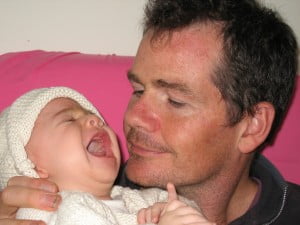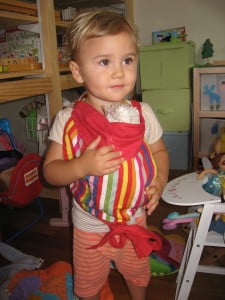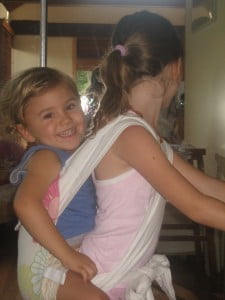One of the many things I love about Aware Parenting is that it can make breast-feeding even more wonderful for mother and baby.
If babies have had some challenges in birth, then they may not feed easily. They may scream when on the breast, or clamp down if they have had a posterior birth, or find it challenging to latch on. Whilst not all of these are symptoms of birth feelings, they often are. One new mum noticed that her newborn baby fed much more easily and peacefully once he had had a cry in her arms the day after his birth.
My son had a fast posterior birth. When he first latched on, he clamped down hard. I imagined that the pressure on his head and jaw was being expressed in that clamping. I listened to him crying in my arms on that first night and the clamping was much less. He had several cries on those first couple of days, and each time his jaw became more and more relaxed, until he was feeding peacefully and relaxedly by day two.
Some mothers give up breast-feeding because of issues that in many cases be helped crying in arms to release the baby’s feelings around birth. (Craniosacral and other modalities are also helpful).
For example, a dear friend and colleague recently wrote, “I actually hadn’t experienced a truly calm breastfeed with Charlie until she was around 5 months old, until after she had caught up on her crying and it was just such a different experience..no on/off, no more cracked/grazed and regrazed nipples, no more mastitis, just long, slow, deep sucks, no kicking me, pulling on/off, grabbing at me…. what a gift that was for me to get to experience that, so grateful…”
Recently, I was visiting a friend (who is an Aware Parenting Instructor) and her 4 week old baby. We noticed that even though she had been doing crying in arms every day when all his needs were met, that the percentage wasn’t quite high enough to help him feel deeply relaxed. He had a catch up day with us both, where he cried in her arms and then my arms for quite a long time. We saw that when he fed after that, his feeds were so calm. He sucked regularly and interestedly. He didn’t wriggle or move his arms and legs; he was relaxed. He didn’t come on and off the breast; he didn’t suck intermittently; he didn’t fall asleep soon after getting on the breast. It was beautiful to watch.
Aletha Solter talks very clearly about differentiating between hunger and a need to release in babies, and coming on and off, sucking intermittently, and falling asleep very soon after starting to feed can often mean that the baby wasn’t hungry, but had some uncomfortable feelings to express.
The more we listen to a baby’s feelings when he is upset, and feed him when he is hungry, the more calm and present and relaxed he is when he feeds, which is also more enjoyable for us.
Enough crying in arms helps babies really be present when they are breast-feeding. Deep presence means that they can really feel our presence; they are deeply connnected with us AND enjoying the nourishment that we are giving them.
In comparison, when a baby regularly feeds when she is not hungry but upset, she may not be very present, which actually means that she may not really be feeling deeply connected. She may be a bit dissociated and thus not able to really feel our loving presence.
Listening to our baby’s feelings when she needs to release, and feeding her when she is hungry, leads to deeper presence and connection when feeding, which is more lovely for both mother and baby.
In addition, mothers often come to me saying that they are not enjoying breast-feeding. When we explore this more, often it is because their baby or toddler is very agitated when feeding – coming on and off, wriggling, biting, wanting to feed every hour. When we explore even more, we often find that breastfeeding has become a control pattern. The mother is not enjoying it because she is sensing that her little one is not feeling calm and connected but rather, she is feeling agitated and a bit spaced out. Our intuition tells us this. Over and over again, I have found that when a mother listens to more of her baby or child’s feelings, her little one feeds calmly, and less often, and is more present and connected when she is. This of course is more enjoyable for mum, and more beneficial for babe.
Listening to feelings also supports extended breast-feeding. A while ago, a lovely mumma came for a session as her toddler was waking many times at night. Many of the other mums in a group she was in were going through the same thing, and many of them stopped breastfeeding because they thought that was the only way that they could get some sleep. After the session, he had a couple of big cries with her and started sleeping through the night. She was so happy. She went back to her group and shared her story. Some of the other mothers were sad when they saw that there had been another option and tried to reinstate breast-feeding. This mum is still happily breastfeeding.
So, Aware Parenting and listening to our baby and child’s feelings can actually:
Help mothers continue breastfeeding their babies by helping them release birth feelings;
Help create more enjoyment during feeding for mother and baby;
Help create more connection during feeding,
Help more extended breastfeeding.
Aware Parenting supports a beautiful feeding relationship between a mother and her newborn, baby, toddler and child.





